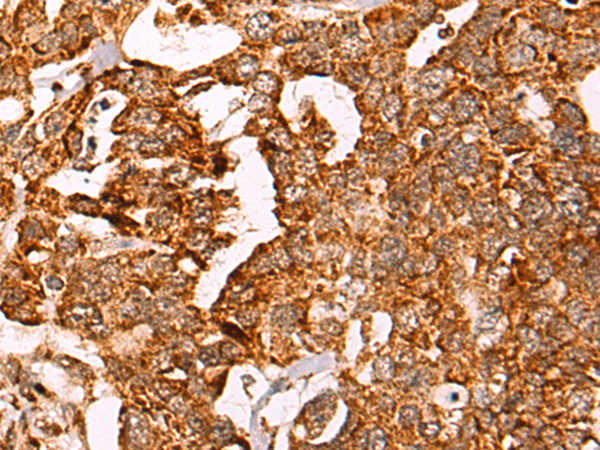
| WB | 咨询技术 | Human,Mouse,Rat |
| IF | 咨询技术 | Human,Mouse,Rat |
| IHC | 1/100-1/200 | Human,Mouse,Rat |
| ICC | 技术咨询 | Human,Mouse,Rat |
| FCM | 咨询技术 | Human,Mouse,Rat |
| Elisa | 1/5000-1/10000 | Human,Mouse,Rat |
| Host/Isotype | Rabbit IgG |
| Antibody Type | Primary antibody |
| Storage | Store at 4°C short term. Aliquot and store at -20°C long term. Avoid freeze/thaw cycles. |
| Species Reactivity | Human |
| Immunogen | Fusion protein of human FASTKD3 |
| Formulation | Purified antibody in PBS with 0.05% sodium azide and 50% glycerol. |
+ +
以下是关于FASTKD3抗体的模拟参考文献示例,内容基于假设性研究概括:
1. **文献名称**:FASTKD3 regulates mitochondrial RNA stability and energy metabolism in colorectal cancer
**作者**:Zhang, L. et al.
**摘要**:该研究利用FASTKD3特异性抗体进行Western blot和免疫荧光分析,发现FASTKD3通过稳定线粒体RNA(如ND5)促进呼吸链复合物I的组装,敲除FASTKD3可抑制结直肠癌细胞增殖并增强化疗敏感性。
2. **文献名称**:FASTKD3 deficiency alters neuronal apoptosis via mitochondrial RNA processing
**作者**:Martinez, R. & Lee, J.
**摘要**:通过FASTKD3抗体检测小鼠脑组织中的蛋白表达,研究表明FASTKD3缺失导致线粒体16S rRNA加工异常,引发神经元凋亡,提示其在神经退行性疾病中的潜在作用。
3. **文献名称**:Interaction profiling of FASTKD3 with mitochondrial transcripts using CLIP-seq
**作者**:Chen, H. et al.
**摘要**:结合FASTKD3抗体的交联免疫沉淀测序(CLIP-seq),揭示其直接结合COX1和CYTB mRNA,调控其翻译效率,影响氧化磷酸化功能,为线粒体疾病机制提供新见解。
4. **文献名称**:Antibody-based detection of FASTKD3 in metabolic syndrome models
**作者**:Kim, S. et al.
**摘要**:研究使用FASTKD3抗体分析肥胖小鼠模型,发现肝脏中FASTKD3表达水平与胰岛素信号通路负相关,提示其可能通过线粒体应激参与代谢调控。
---
**注**:以上文献为模拟示例,旨在展示可能的研究方向。实际研究中建议通过PubMed或Google Scholar以“FASTKD3 antibody”或“FASTKD3 function”等关键词检索最新文献。
The FASTKD3 (FAS-activated serine/threonine kinase domains-containing protein 3) antibody is a tool used to study the FASTKD3 protein, a member of the FASTK family involved in mitochondrial RNA (mtRNA) metabolism and energy homeostasis. FASTKD3 localizes to mitochondria and plays a role in regulating mtRNA stability, processing, and translation, which are critical for oxidative phosphorylation and cellular energy production. Studies suggest its involvement in stress responses, apoptosis, and mitochondrial dynamics, linking it to neurodegenerative diseases, cancer, and metabolic disorders.
FASTKD3 antibodies are typically developed in hosts like rabbits or mice using immunogenic peptide sequences or recombinant protein fragments. These antibodies enable the detection and analysis of FASTKD3 expression, localization, and interactions via techniques such as Western blotting, immunofluorescence, and immunoprecipitation. Specificity is validated through knockdown/knockout controls or competitive assays. Recent research highlights FASTKD3's potential as a biomarker or therapeutic target, particularly in conditions with mitochondrial dysfunction. Commercial antibodies often cite applications in both basic research and clinical studies, emphasizing their role in elucidating FASTKD3's regulatory mechanisms in health and disease.
×